- Home
- Burt L. Standish
From Squire to Squatter: A Tale of the Old Land and the New Page 2
From Squire to Squatter: A Tale of the Old Land and the New Read online
Page 2
beautiful all round, and in some parts even wild;while the distant views of the Cheviot Hills lent a charm to everything.
There was something else held sacred by the Squire as well as thehabitable mansion, and that was Burley Old Castle. Undoubtedly afortress of considerable strength it had been in bygone days, when thewild Scots used to come raiding here, but there was no name for it nowsave that of a "ruin." The great north tower still stood firm and bold,and three walls of the lordly hall, its floor green with long, rankgrass; the walls themselves partly covered with ivy, with broom growingon the top, which was broad enough for the half-wild goats to scamperalong.
There was also the _donjon_ keep, and the remains of a _fosse_; but allthe rest of this feudal castle had been unceremoniously carted away, toerect cowsheds and pig-styes with it.
"So sinks the pride of former days, When glory's thrill is o'er."
No, Squire Broadbent did not interfere with the castle; he left it tothe goats and to Archie, who took to it as a favourite resort from thetime he could crawl.
But these--all these--new-fangled notions the neighbouring squires andfarmers bold could easily have forgiven, had Broadbent not carried hiscraze for machinery to the very verge of folly. So _they_ thought.Such things might be all very well in America, but they were not calledfor here. Extraordinary mills driven by steam, no lesswonderful-looking harrows, uncanny-like drags and drilling machines,sowing and reaping machines that were fearfully and wonderfully made,and ploughs that, like the mills, were worked by steam.
Terrible inventions these; and even the men that were connected withthem had to be brought from the far South, and did not talk a homely,wholesome _lingua_, nor live in a homely, wholesome way.
His neighbours confessed that his crops were heavier, and the cerealsand roots finer; but they said to each other knowingly, "What about theexpense of down-put?" And as far as their own fields went, theplough-boy still whistled to and from his work.
Then the new live stock, why, type was followed; type was everything inthe Squire's eye and opinion. No matter what they were, horses, cattle,pigs, sheep, and feather stock, even the dogs and birds were the bestand purest of the sort to be had.
But for all the head-shaking there had been at first, things reallyappeared to prosper with the Squire; his big, yellow-painted wagons,with their fine Clydesdale horses, were as well known in the districtand town of B--as the brewer's dray itself. The "nags" were capitallyharnessed. What with jet-black, shining leather, brass-work that shonelike burnished gold, and crimson-flashing fringes, it was no wonder thatthe men who drove them were proud, and that they were favourites atevery house of call. Even the bailiff himself, on his spirited hunter,looked imposing with his whip in his hand, and in his spotless cords.
Breakfast at Burley was a favourite meal, and a pretty early one, andthe capital habit of inviting friends thereto was kept up. MrsBroadbent's tea was something to taste and remember; while the coldbeef, or that early spring lamb on the sideboard, would have convertedthe veriest vegetarian as soon as he clapped eyes on it.
On his spring lamb the Squire rather prided himself, and he liked hisdue meed of praise for having reared it. To be sure he got it; thoughsome of the straightforward Northumbrians would occasionally quizzinglyenquire what it cost him to put on the table.
Squire Broadbent would not get out of temper whatever was said, andreally, to do the man justice, it must be allowed that there was aglorious halo of self-reliance around his head; and altogether suchspirit, dash, and independence with all he said and did, that those whobreakfasted with him seemed to catch the infection. Their farms andthey themselves appeared quite behind the times, when viewed incomparison with Broadbent's and with Broadbent himself.
If ever a father was loved and admired by a son, the Squire was thatman, and Archie was that particular son. His father was Archie's _beauideal_ indeed of all that was worth being, or saying, or knowing, inthis world; and Rupert's as well.
He really was his boys' hero, but behaved more to them as if he had beenjust a big brother. It was a great grief to both of them that Rupertcould not join in their games out on the lawn in summer--the littlecricket matches, the tennis tournaments, the jumping, and romping, andracing. The tutor was younger than the Squire by many years, but hecould not beat him in any manly game you could mention.
Yes, it was sad about Rupert; but with all the little lad's sufferingand weariness, he was _such_ a sunny-faced chap. He never complained,and when sturdy, great, brown-faced Archie carried him out as if he hadbeen a baby, and laid him on the couch where he could witness the games,he was delighted beyond description.
I'm quite sure that the Squire often and often kept on playing longerthan he would otherwise have done just to please the child, as he wasgenerally called. As for Elsie, she did all her brother did, and a gooddeal more besides, and yet no one could have called her a tom girl.
As the Squire was Archie's hero, I suppose the boy could not help takingafter his hero to some extent; but it was not only surprising but evenamusing to notice how like to his "dad" in all his ways Archie had atthe age of ten become. The same in walk, the same in talk, the same ingiving his opinion, and the same in bright, determined looks. Archiereally was what his father's friends called him, "a chip of the oldblock."
He was a kind of a lad, too, that grown-up men folks could not helphaving a good, romping lark with. Not a young farmer that ever came tothe place could have beaten Archie at a race; but when some of them didget hold of him out on the lawn of an evening, then there would be a bitof fun, and Archie was in it.
These burly Northumbrians would positively play a kind of pitch and tosswith him, standing in a square or triangle and throwing him back andfore as if he had been a cricket ball. And there was one very tall,wiry young fellow who treated Archie as if he had been a sort ofdumb-bell, and took any amount of exercise out of him; holding him highaloft with one hand, swaying him round and round and up and down,changing hands, and, in a word, going through as many motions with thelaughing boy as if he had been inanimate.
------------------------------------------------------------------------
I do not think that Archie ever dressed more quickly in his life, thanhe did on the morning of that auspicious day which saw him ten yearsold. To tell the truth, he had never been very much struck over thebenefits of early rising, especially on mornings in winter. The partingbetween the boy and his warm bed was often of a most affectingcharacter. The servant would knock, and the gong would go, andsometimes he would even hear his father's voice in the hall before hemade up his mind to tear himself away.
But on this particular morning, no sooner had he rubbed his eyes andbegan to remember things, than he sprang nimbly to the floor. The bathwas never a terrible ordeal to Archie, as it is to some lads. He likedit because it made him feel light and buoyant, and made him sing likethe happy birds in spring time; but to-day he did think it would be asaving of time to omit it. Yes, but it would be cowardly, and on thismorning of all mornings; so in he plunged, and plied the spongemanfully. He did not draw up the blinds till well-nigh dressed. Forall he could see when he did do so, he might as well have left themdown. The windows--the month was January--were hard frozen; had it beenany other day, he would have paused to admire the beautiful frostfoliage and frost ferns that nature had etched on the panes. He blewhis breath on the glass instead, and made a clean round hole thereon.
Glorious! It had been snowing pretty heavily, but now the sky wasclear. The footprints of the wily fox could be tracked. Archie wouldfollow him to his den in the wild woods, and his Skye terriers wouldunearth him. Then the boy knelt to pray, just reviewing the past for ashort time before he did so, and thinking what a deal he had to bethankful for; how kind the good Father was to have given him suchparents, such a beautiful home, and such health, and thinking too what adeal he had to be sorry for in the year that was gone; then he gavethanks, and prayer for strength to resist temptation in the time tocome; an
d, it is needless to say, he prayed for poor invalid Rupert.
When he got up from his knees he heard the great gong sounded, andsmiled to himself to think how early he was. Then he blew on the paneand looked out again. The sky was blue and clear, and there was not abreath of wind; the trees on the lawn, laden with their weight ofpowdery snow, their branches bending earthwards, especially the larchesand spruces, were a sight to see. And the snow-covered lawn itself, oh,how beautiful! Archie wondered if the streets of heaven even could bemore pure, more dazzlingly white.
Whick, whick, whick, whir-r-r-r-r!
It was a big yellow-billed blackbird, that flew out with startled cryfrom a small Austrian pine tree. As it did so, a cloud of powdery snowrose in the air, showing how hard the frost was.
Early though it was--only a little past eight--Archie found his fatherand mother in the breakfast-room, and greetings and blessings fell onhis head;

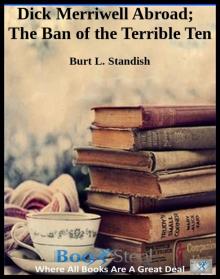 Dick Merriwell Abroad; Or, The Ban of the Terrible Ten
Dick Merriwell Abroad; Or, The Ban of the Terrible Ten Wild Adventures round the Pole
Wild Adventures round the Pole Storm-Bound; or, A Vacation Among the Snow Drifts
Storm-Bound; or, A Vacation Among the Snow Drifts In the Yellow Sea
In the Yellow Sea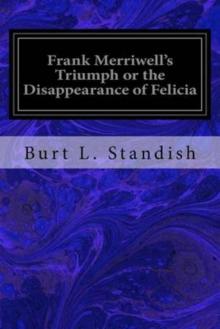 Frank Merriwell's Triumph; Or, The Disappearance of Felicia
Frank Merriwell's Triumph; Or, The Disappearance of Felicia Treasure of Kings
Treasure of Kings Bert Wilson's Twin Cylinder Racer
Bert Wilson's Twin Cylinder Racer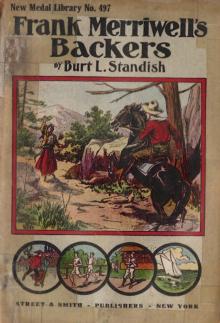 Frank Merriwell's Backers; Or, The Pride of His Friends
Frank Merriwell's Backers; Or, The Pride of His Friends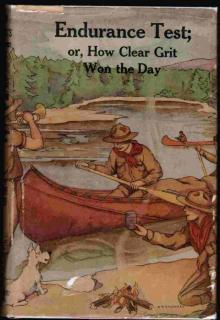 Endurance Test; or, How Clear Grit Won the Day
Endurance Test; or, How Clear Grit Won the Day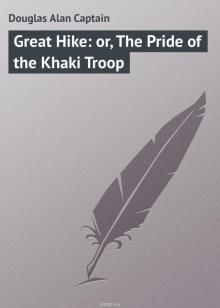 Great Hike; or, The Pride of the Khaki Troop
Great Hike; or, The Pride of the Khaki Troop The Swan and Her Crew
The Swan and Her Crew A cup of sweets, that can never cloy: or, delightful tales for good children
A cup of sweets, that can never cloy: or, delightful tales for good children Frank Merriwell's Bravery
Frank Merriwell's Bravery Frank Merriwell Down South
Frank Merriwell Down South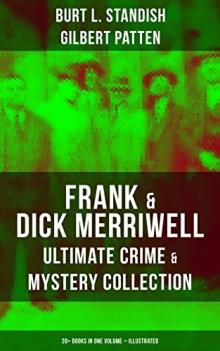 Dick Merriwell's Trap; Or, The Chap Who Bungled
Dick Merriwell's Trap; Or, The Chap Who Bungled The Trail of the Seneca
The Trail of the Seneca Wild Life in the Land of the Giants: A Tale of Two Brothers
Wild Life in the Land of the Giants: A Tale of Two Brothers From Squire to Squatter: A Tale of the Old Land and the New
From Squire to Squatter: A Tale of the Old Land and the New The Cruise of the Snowbird: A Story of Arctic Adventure
The Cruise of the Snowbird: A Story of Arctic Adventure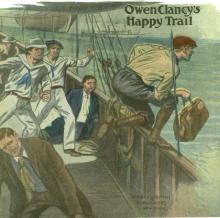 Owen Clancy's Happy Trail; Or, The Motor Wizard in California
Owen Clancy's Happy Trail; Or, The Motor Wizard in California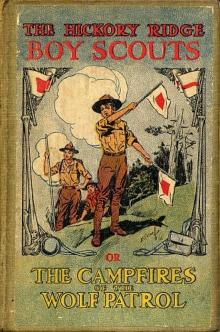 Boy Scouts: Tenderfoot Squad; or, Camping at Raccoon Lodge
Boy Scouts: Tenderfoot Squad; or, Camping at Raccoon Lodge Sing a Song of Sixpence
Sing a Song of Sixpence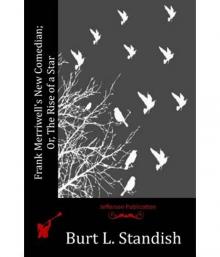 Frank Merriwell's New Comedian; Or, The Rise of a Star
Frank Merriwell's New Comedian; Or, The Rise of a Star The Sa'-Zada Tales
The Sa'-Zada Tales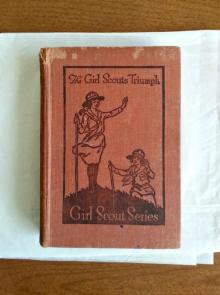 The Girl Scout's Triumph; or, Rosanna's Sacrifice
The Girl Scout's Triumph; or, Rosanna's Sacrifice Wild Adventures in Wild Places
Wild Adventures in Wild Places Fairies I Have Met
Fairies I Have Met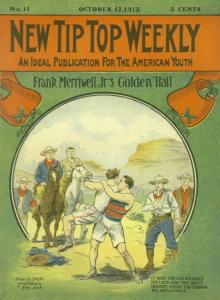 Frank Merriwell's Son; Or, A Chip Off the Old Block
Frank Merriwell's Son; Or, A Chip Off the Old Block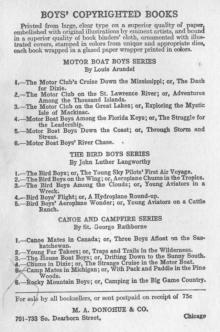 Motor Boat Boys' River Chase; or, Six Chums Afloat and Ashore
Motor Boat Boys' River Chase; or, Six Chums Afloat and Ashore Frank Merriwell's Athletes; Or, The Boys Who Won
Frank Merriwell's Athletes; Or, The Boys Who Won Bart Keene's Hunting Days; or, The Darewell Chums in a Winter Camp
Bart Keene's Hunting Days; or, The Darewell Chums in a Winter Camp Captain June
Captain June